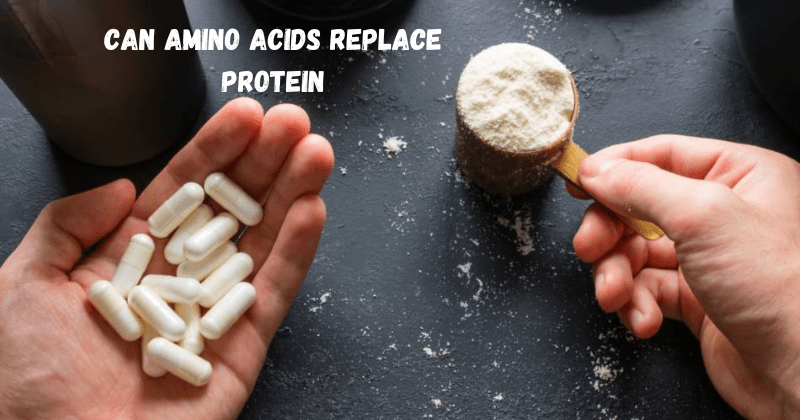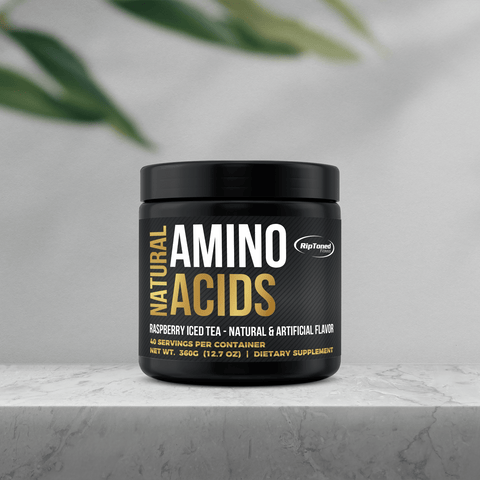
Can Amino Acids Replace Protein
Share
Are you looking to build muscle, achieve peak gym performance, or get healthier overall? Then you should know how important protein is. Protein provides your body with essential amino acids that repair and create new tissues, including enzymes and hormones. But can this vital macronutrient be replaced by something else?
In this blog post, we'll explore whether amino acids can replace the roles taken on by food sources of protein. We investigated the help – and the harm they may have on a person's health when trying to reach their fitness goals. You won't want to miss out.
What are Amino Acids and How Do They Work?
Amino acids are the building blocks of protein. They contain both amine and carboxyl groups and a side chain that varies based on the specific amino acid. There are 20 standard amino acids that make up the proteins in our body, and they play crucial roles in various biological processes.
Muscle protein synthesis begins with the breakdown of dietary protein into individual amino acids. These amino acids are then transported to our cells, where they are recombined to form specific proteins needed for various functions in the body. Each protein is composed of a unique sequence of amino acids, giving it its distinct shape and function.
Our bodies can produce some amino acids; others must be obtained through diet. The body cannot produce essential amino acids, including histidine, isoleucine, leucine, lysine, methionine, phenylalanine, threonine, tryptophan, and valine. These essential amino acids must be obtained through food sources in order for our bodies to function properly.
Can Amino Acids Replace Protein?
Amino acids cannot replace whey protein entirely, as the body needs a balance of all essential amino acids to function properly. However, they can be supplements to support muscle growth and repair.
One of the main benefits of consuming amino acid supplements is that they are quickly absorbed by the body, allowing for faster delivery of nutrients to the muscles. This can be particularly beneficial for athletes and individuals who engage in strenuous physical activities, as their muscles may require additional support for repair and growth.
Moreover, some amino acids have been found to help regulate hormone production and improve immune function. For example, glutamine has been shown to boost the immune system and support gut health, while arginine has been linked to improved hormone regulation and blood flow.
However, it is important to note that consuming too many amino acid supplements can have negative effects on the body. Excessive consumption of certain amino acids, such as methionine or lysine, can lead to imbalances in other essential amino acids. This can potentially harm our health and hinder our fitness goals.
Relying solely on amino acid supplements for protein intake can also lead to nutrient deficiencies. Whole food sources of protein provide a range of other essential nutrients, such as vitamins and minerals that are important for overall health. Therefore, consuming a balanced diet that includes both whole food sources of protein and amino acid supplements is recommended.
Why Amino Acids Are a Good Alternative to Protein
While amino acids cannot fully replace protein, they can be a beneficial complement to our diets. Amino acid supplements are convenient and easy to consume, making them a great option for individuals who struggle with meeting their daily protein requirements through whole food sources.
Amino acid supplements can also provide specific benefits that may not be readily available through whole food sources of protein. For example, branched-chain amino acids (BCAAs) have been found to improve exercise performance and reduce muscle fatigue.
For individuals with specific dietary needs, such as vegetarians or vegans who may struggle to obtain all essential amino acids through plant-based sources, amino acid supplements can help bridge the gap.
However, it is important to note that whole food sources of protein should still make up the majority of our protein intake. Amino acid supplements should only be used as a supplement, not a substitute for whole food sources.
Benefits of Consuming Amino Acids Over Protein
There are several benefits to consuming amino acids over protein, particularly when it comes to achieving fitness goals.
One major benefit is the quick absorption of amino acid supplements. As mentioned earlier, this can be beneficial for athletes and individuals who engage in regular physical activity, as their muscles may require additional support for repair and growth.
Consuming amino acid supplements can also be easier on the digestive system. Some individuals may struggle with digesting protein powders from whole food sources, leading to feelings of bloating or discomfort. Amino acid supplements are already in their broken-down form, making them more accessible for the body to absorb and utilize.
Amino acid supplements do not contain any additional calories or fat that may be present in some protein sources. This can be helpful for individuals who are trying to manage their calorie intake while still meeting their protein requirements.
Foods That Contain Amino Acids
Here are some foods that contain a good amount of amino acids:
- Meat and poultry: These are excellent sources of all essential amino acids, making them a complete protein source.
- Fish and seafood: Many types of fish and seafood are also rich in essential amino acids. For example, salmon is high in lysine and threonine, while tuna is high in histidine. Some seafood, such as oysters, also contain a good amount of zinc, which is important for immune function.
- Dairy products: Milk, cheese, and yogurt are good sources of essential amino acids. They also provide calcium and vitamin D, which are important for bone health.
- Eggs: Eggs are another complete protein source that contains all essential amino acids.
- Beans, lentils, and legumes: These plant-based sources of protein powder also contain a good amount of essential amino acids. For example, black beans are high in lysine and threonine, while chickpeas are high in methionine and tryptophan.
- Nuts and seeds: Almonds, cashews, pumpkin seeds, and chia seeds are all good sources of essential amino acids.
- Grains: Quinoa, amaranth, and oats are all considered complete protein supplements as they contain all essential amino acids in varying amounts.
It is important to note that while these foods contain a good amount of amino acids, consuming them alone may not provide enough muscle protein to meet daily requirements.
Tips for Incorporating Amino Acids into Your Diet
Here are some tips for incorporating amino acids into your diet:
- Supplements: The most common way to consume amino acids is through supplements. These can come in the form of powders, capsules, or liquids and can easily be added to water, smoothies, or other beverages.
- Timing: It is recommended to consume amino acid supplements before or after a workout to support muscle growth and repair. However, they can also be consumed at any other time during the day.
- Pair with carbohydrates: Consuming amino acids with carbohydrates can help improve their absorption by the body. This is because carbohydrates trigger insulin production, which helps transport amino acids into our cells.
- Mix it up: Don't rely solely on one type of amino acid supplement. Instead, try to incorporate a variety of essential amino acids into your diet for optimal benefits.
- Consult a professional: If you have any underlying health conditions or are taking medication, it is important to consult with a healthcare professional before incorporating amino acid supplements into your diet.
Potential Risks and Side Effects of Consuming Too Much Amino Acid Supplements
There are potential risks and side effects of consuming too many amino acid supplements, including:
First, consuming too many amino acid supplements can cause an imbalance in our bodies' levels of essential and non-essential amino acids. This can potentially lead to negative effects on our health.
In addition, some individuals may experience digestive discomfort or diarrhea when first starting with amino acid supplements. This is because these supplements are highly concentrated, and the body may need time to adjust. It is important to start with a lower dosage and gradually increase as needed.
Individuals with certain health conditions, such as kidney disease or liver disease, may need to be cautious when consuming amino acid supplements. This is because our kidneys and liver are responsible for filtering out excess amino acids from the body, so consuming too much can put a strain on these organs.
It is important to consult with a healthcare professional before incorporating amino acid supplements into your diet.
Lastly, it is important to note that consuming too much protein can strain our kidneys and liver. This is because these organs have to work harder to filter out excess protein from the body, which can potentially lead to kidney or liver damage over time.
FAQs
Are amino acid supplements safe for everyone to consume?
While amino acid supplements are generally considered safe, it is important to consult with a healthcare professional before incorporating them into your diet, especially if you have any underlying health conditions or are taking medication.
Can I get all the necessary amino acids from food alone?
Yes, getting all essential and non-essential amino acids from food alone is possible. However, consuming enough of certain nine essential amino acids through diet alone may be challenging, which is where supplements can be helpful.
How much protein do I need per day?
The recommended daily allowance for protein varies based on age, gender, and activity level. Generally, the recommended intake for adults is around 0.8 grams of protein per kilogram of body weight, but this can vary. It is best to consult with a healthcare professional to determine your specific protein needs.
Conclusion
Amino acids play a crucial role in many functions of our body, including building muscle, supporting immune function, and producing hormones. Consuming a balanced diet that includes a variety of protein sources can provide all essential and non-essential amino acids needed for optimal health.
However, for those who may need additional support, amino acid supplements can be beneficial when used safely and in moderation. Consult with a healthcare professional for personalized recommendations, and always follow the recommended dosage on supplement labels.
With proper knowledge and caution, amino acid supplements can be a helpful addition to one's diet. So don't forget to incorporate these important nutrients into your daily meals for optimal health! Remember that balance is key, so remember to listen to your body and consult a professional if you have any concerns.


1 comment
Very informative